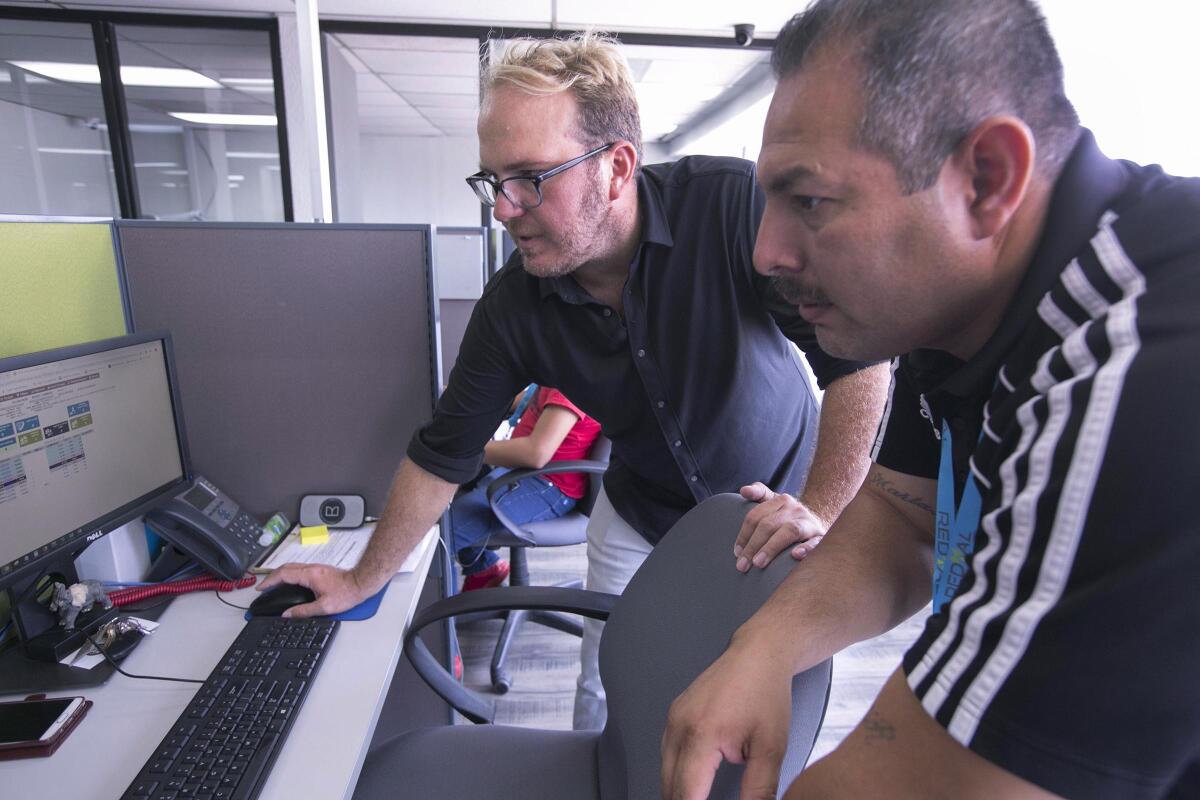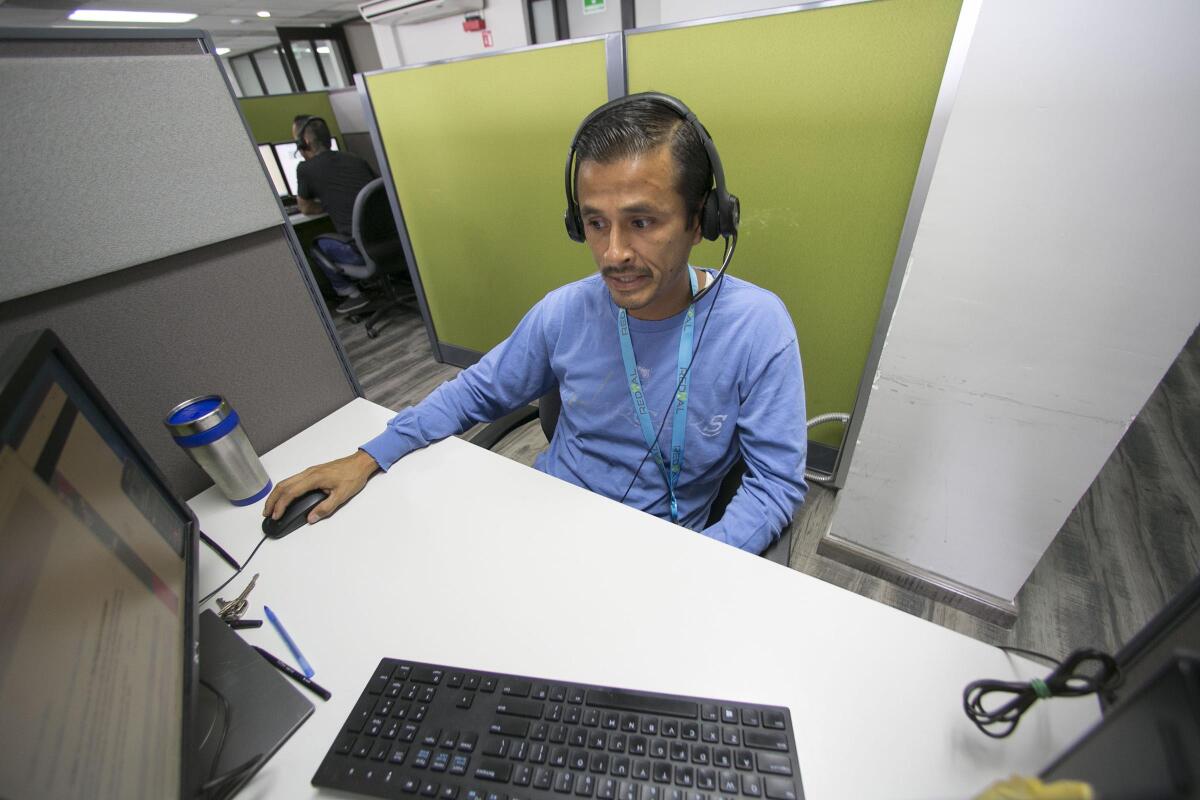Tijuana’s call centers offer a lifeline to deportees struggling to live in Mexico

Call centers in Tijuana are booming and deportees who spent most of their lives living in the United States are a large part of that growth.
- Share via
TIJUANA — Richard Avila was 56 when he was deported to Mexico eight years ago. He had lived in East Los Angeles since he was 2 and the idea of living in Tijuana felt to him as if he were being sent to the moon.
“When I first got here, it was complete culture shock,” he said. “It was a struggle every day.”
Like thousands of deportees who have spent most of their lives in the United States, Avila didn’t know where he fit in. He wasn’t American, but he also wasn’t Mexican. He lived in a sort of bicultural limbo where something as small as the way he spoke put a target on his back.
Whenever Mexican coworkers at the maquiladora he worked in heard his accent, they called him, “pocho,” a derogatory term for “Mexican” who left their homeland.
For the first couple of years in Tijuana, Avila kept his head down, didn’t make many friends and just accepted the discrimination.
It wasn’t until he found a job in one of Tijuana’s call centers that he began to feel at home in the border city south of San Diego.
“For deportees, call centers are the best possible job you could think of,” Avila said.
For starters, call center jobs pay more than construction or maquiladora work. But, more importantly, Avila’s ability to speak English was seen as an asset instead of as a scarlet letter.
Over the last two decades, the number of call centers in Tijuana has grown from roughly 10 to more than 60. And the majority of them employ deportees like Avila, said Jose Salvatierra, a recruiter with more than 16 years’ experience in the industry.
Historically, India has been the call center capital of the world. But Tijuana has been able to lure call centers away from India because of the city’s availability of accent-neutral English speakers and Mexico’s low wages relative to those of the United States.
“Tijuana has become like the new Bombay,” said Salvatierra. “India is no longer the first option.”
Apart from bringing companies from India or the Philippines, Tijuana’s call center boom has also caught the attention of California-based companies that cannot afford to keep up with the rising minimum wage.
Redial BPO, the company that both Avila and Salvatierra work for, moved to Tijuana a few years ago and was pleasantly surprised to find so many English-speaking phone operators, or agents as they are known in the industry. About 90% of their agents are deportees.
Deportees are valuable because they know a lot about American culture. In sales, they can use that knowledge to engage in small talk, find shared interests and quickly establish rapport to close a sale.
“They don’t just speak English, they speak American, which is very different,” said one of Redial’s cofounders, Jason Heil.
For example, Heil points out, deportees know to ask about last Sunday’s Dallas Cowboys game if they are speaking on the phone with someone from Texas.
Redial, which was founded by twin brothers who grew up in San Diego and often travel to Baja, embraced their new home south of the border.
During last summer’s World Cup, they shut down the office and ordered a buffet as they watched Mexico play Sweden.
“I keep forgetting that Mexico is another country,” said cofounder Chris Heil. “It’s just like another neighborhood for us — besides this fence.”

One of Redial’s biggest challenges in Tijuana is finding and retaining talented agents. Because there are so many call centers, there is a high demand for English speakers willing to work the phones. That means wages have increased — although they are still much lower than those in America.
To set itself apart from the competition, Redial has imported some American business culture to Tijuana. For instance, each agent has a wide desk with two monitors. Other call centers are known for squeezing in as many agents to white plastic tables that college students use to play beer pong.
Additionally, the company maintains a five-day work week instead of Mexico’s customary six-day workweek. Whenever an employee has a birthday, his or her cubicle is decorated with balloons.
Deportees used to working in the United States appreciate these gestures.
“Even though we are Mexican-born, we’re American-bred,” said David Garcia, 35. “That paper doesn’t say we’re American, but our culture, our way of being is American.”
Garcia was brought to the United States as a child. He grew up in southeast San Diego, went to Jones Elementary and lived in Shelltown.
Like Avila, he struggled to find his place in Tijuana and faced some discrimination from other Mexicans. But, within a month of being deported in 2010, he found a call center job and started to meet other deportees.
The world didn’t seem so big anymore.
“I met people here who I went to middle school with,” he said.
Garcia uses his base salary to pay for an apartment and send his two kids to private school in Tijuana. His commission pays for everything else.
More to Read
Sign up for Essential California
The most important California stories and recommendations in your inbox every morning.
You may occasionally receive promotional content from the Los Angeles Times.











